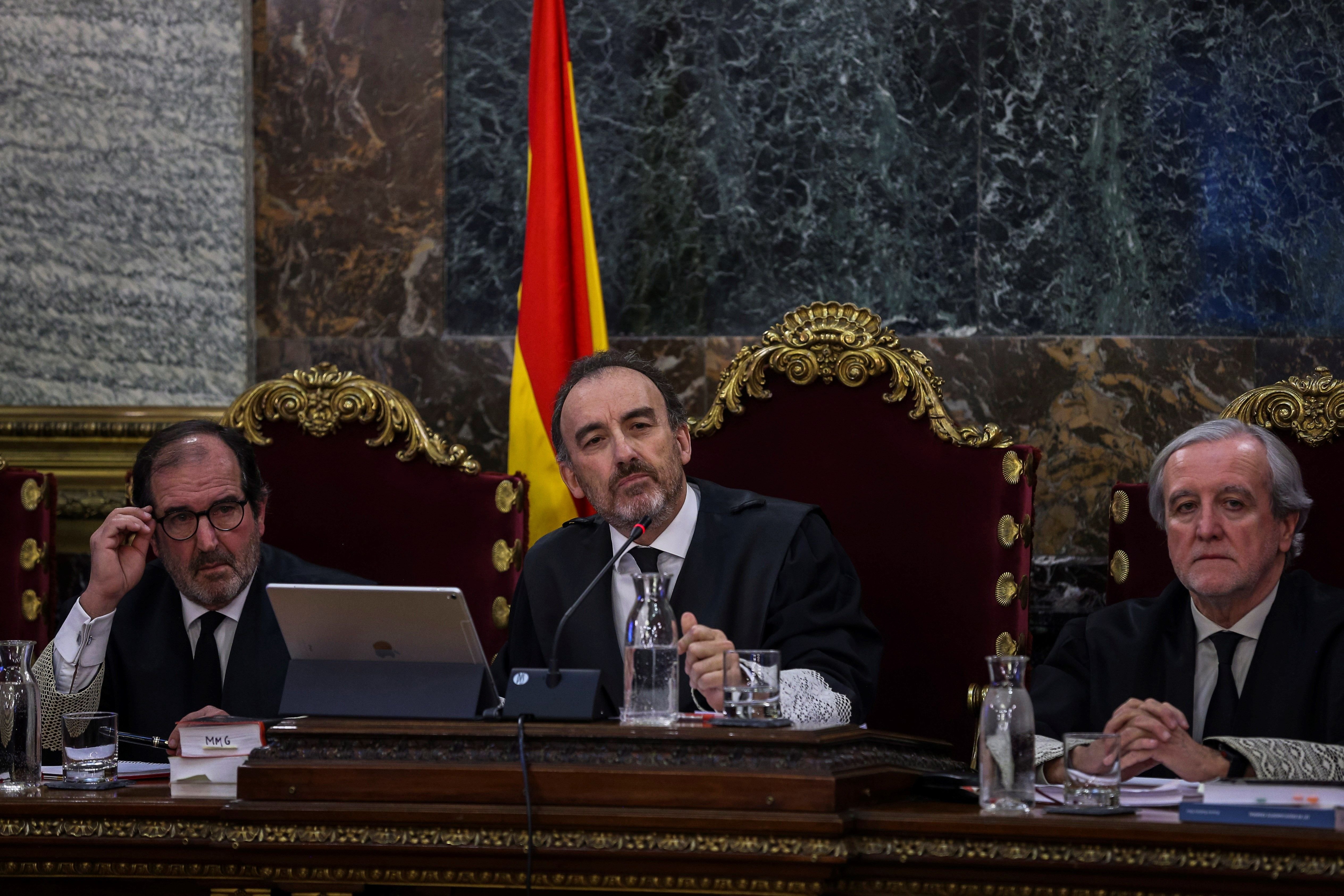Manuel Marchena is the presiding judge in the Catalan independence trial.
With all eyes gazing intensely at the trial, the judge wears an attentive expression and wants to be impeccable. He wants to be the justest of justices. Later, in the verdicts, we'll see how forceful he can be. But now, in front of the cameras, Marchena is a proactive judge who isn't letting the prosecutors get away with anything, and has shown some permissiveness to the prisoners.
He has let the defence lawyers have twice as much time to make their points as they are allowed, according to the jurisprudence of the European Court of Human Rights (ECHR) - the court whose presence hangs permanently over this courtroom. He has let family members enter the Supreme Court room where the accused are held during recesses. He has let the accused wear yellow ribbons. And when he ruled on this issue he had all the jurisprudence prepared and studied.
He did not cut off the political discourse of Oriol Junqueras, even though he had warned he didn't want political meetings. Indeed, the seven judges who are hearing the independence leaders' case remained silent and unfazed, and at no time interrupted the former Catalan vice-president, but rather, simply listened attentively, without making notes of any kind.
Marchena has allowed the prisoners to sit alongside their lawyers. Although it will have to be behind them, since the number of defence lawyers is so large, they won't all fit right beside their clients.
What he has said no to is simultaneous translation, alleging technical reasons. In fact, he said there couldn't be headphones for everyone. And it's true that in a 200-year-old courtroom it is difficult to adapt to such things. The translators, two women who share space with the media during the day, have admitted that a trial with consecutive translation was not the best and understood that none of the accused would make use of it.
Manuel Marchena was especially severe with the public prosecutor and the state solicitor:
State solicitor Rosa María Seoane is instructed to move on to another question by judge Marchena.
And also with the private prosecution led by Vox, of course. And strict he will have to be, because Vox's status as a political party - combined with the calling of a Spanish general election - further complicates the role of this private prosecution and of Manuel Marchena himself, who has to act as referee.
Even the public was told off:
An ironic response from the defendant, former Catalan minister Quim Forn, provoked laughter from the public on day three of the trial. Judge Marchena clamped down immediately, making it clear that no responses, positive or negative, from the public would be tolerated.
Marchena does not want problems. He wants to appear fair and strict. Impeccable. To avoid errors in the conduct of the trial and other possibly-deadlier sins, should the case end up, as seems most probable, before the European Court of Human Rights.
Manuel Marchena, it should be noted, has already once before had to face close examination from the ECHR. For the Garzón case: that is, Baltasar Garzón, the high-profile Spanish judge who in 2012 was convicted, and disqualified as a judge, for irregularities in his investigation of the huge Gürtel corruption case. There were in fact three cases against Garzón, and Marchena took part in them all. Garzón then appealed against the investigations and sentences of Marchena, his judicial executioner.

Marchena, the chameleon
Marchena entered the judiciary as a prosecutor and in 2007 was designated by Spain's General Council of the Judiciary as a Supreme Court judge. From 2012 on, his rise was meteoric.
The thing is, this judge was the figure who both of the established Spanish political parties, PSOE and PP, wanted as president of the Supreme Court and of the General Council of the Judiciary, and they did not hide their desires.
Last November's infamous leak of a Whatsapp message from PP senator Ignacio Cosidó, explaining that through Marchena, "controlling the Supreme Court's Criminal court from behind the scenes", the PP could control the Catalan trial, put an end to the hopes of appointing a new chameleonic president to the General Council of the Judiciary, who had curried favour with both PSOE and PP governments.
The Whatsapp leak also made very clear the politicization that exists in the choice of Spain's top judicial figure, who in theory has to be chosen by the other members of the new judicial council - members that haven't even been chosen yet.
The scandal led to Manuel Marchena's decision, in the middle of the controversy, to renounce the possibility of filling either of the two key judicial presidencies, and instead to remain where he was - as president of the criminal branch of the Supreme Court, and thus able to preside over the current Catalan independence trial.
The doubts about the judicial independence of Marchena thus fall like shadows over the grand courtroom where the trial is taking place. So the judge is anxious to be as scrupulous as possible in all his deeds and words. The world is watching. And the European Court of Human Rights, likewise.

